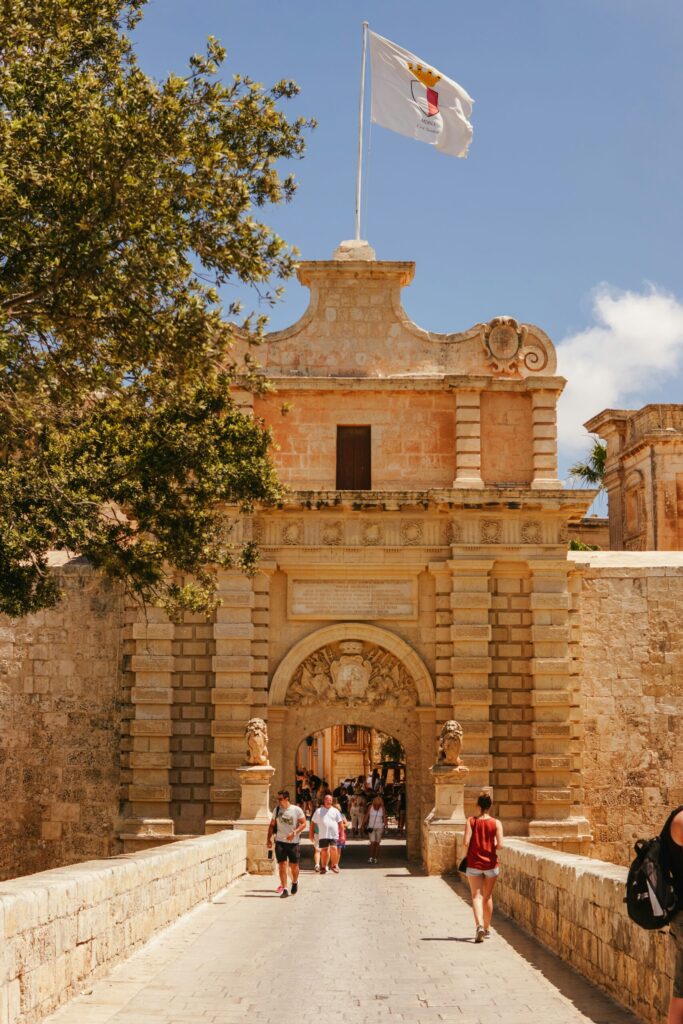The Malta non-dom tax regime is one that commonly comes up with digital nomads who want to improve their tax setup.
In this article we’ll have a look at the benefits and requirements.
Do you want to pay less taxes? Contact me!
Key Tax Benefits of Malta’s Non-Dom Regime
- Applies to tax residents of Malta who are not domiciled there
- Automatic application; no complex procedure
- Excludes foreign income from tax unless remitted back into Malta
- Taxable income is subject to the normal tax rates

Understanding the Malta Non-Dom Tax Regime
The Malta non-dom tax regime applies to individuals who are tax resident of Malta but not domiciled there.
In order to qualify as a tax resident in Malta, you’ll generally have to live there for 183 days throughout the year (183-day rule).
Nevertheless, you can also qualify as a tax resident while spending less time in Malta but only if you visit Malta frequently and have your vital interests in the country.
Nevertheless, this option is not the best way to establish tax residency at first.
What Income is Taxed under Malta Non-Dom Status?
As a non-domiciled taxpayer in Malta you’ll only pay tax on income arising in Malta and on foreign income on a remittance basis. Foreign capital gains remain tax free, even if you bring them back into Malta.
Basically, you could summarize it as follows:
- Always taxable in Malta:
- Income arising in Malta
- Foreign income received in Malta
- Never taxable in Malta:
- Foreign income not remitted back into Malta
- Foreign capital gains (even if remitted back)
In this regard, it’s important to understand when income is deemed to arise in Malta.
For professional income. the income arises in Malta if you perform the work there. So, just having foreign clients won’t cut it.
Investment income on the other hand arises in the source country.
A similar approach applies for rental income which is linked to the country where the real estate is located.
As an add-on, it’s also interesting to note that Malta doesn’t apply gift or inheritance taxes.
Malta Non-Dom Tax Rates and Minimum Tax
Malta does not have separate tax rates for non-domiciled individuals. The regime mainly limits the income that is taken into account to determine your tax burden.
If you are a tax resident of Malta and also have your domicile there, you would pay income tax on your worldwide income.
The benefit of the non-domiciled regime is that you only pay income tax on local income and income brought back into the country.
Therefore, the normal progressive tax rates will apply to any income that is actually taxable in Malta. You can learn more about the different tax rates in my article about tax residency in Malta.
Yet, you will also need to take into account that there is a minimum tax of EUR 5.000 per year.
However, if your foreign income is less than EUR 35.000 you get an exemption from this.
Moreover, other exemptions can apply if you benefit from specific tax regimes.
Requirements to Qualify for Malta Non-Dom Status
The Malta non-dom tax regime applies automatically if you become a Maltese tax resident and don’t have your domicile in the country.
As a foreigner you won’t normally be considered as having your domicile in Malta. The exemption would be when you really settle there for many years and move your whole personal and economic life there.
How to Apply for and Maintain Malta Non-Dom Status
Because the automatic application of the Malta-non dom tax you don’t need to file a specific application or anything like that.
You will be able to keep the non-domiciled status for many years. There is no clear cut-off time but most of the time it suffice that you declare you don’t have the intention to live in Malta forever if asked for it.

Let Me Help You Pay Less Taxes
Exploring the Maltese non-dom regime can open up interesting opportunities, but the details matter. Every situation is different, and the right approach depends on your personal circumstances and goals.
If you’d like tailored guidance on how Malta – or other jurisdictions – could fit into your international tax strategy, I’d be happy to help you map out the best path forward.
FAQ about Malta Non-Dom Tax Regime
Let’s have a look at some Frequently Asked Questions about the Malta non-dom tax regime.
Can I Live Tax Free in Malta?
Living completely tax free in Malta most of the time is not possible.
Yet, Malta offers some good tax incentives and interesting tax rules due to which you can minimize your tax burden to the minimum. Therefore, many still consider it a tax haven.
What Are the Tax Incentives for Foreigners in Malta?
The most common tax incentive in Malta for foreigners is the non-domiciled tax regime. It’s the most simple and used tax incentive.
Nevertheless, Malta also offers specific tax regimes which mostly target (ultra) high-net-worth individuals like The Residence Program (TRP) and the Global Residence Program (GRP).
Malta also has a specific tax regime for people who get the Maltese digital nomad visa. This is an interesting option if you are a digital nomad from outside the EU/EEA/Switzerland.
How to Avoid Malta Tax on Foreign Capital Gains?
You will easily avoid tax on foreign capital gains in Malta. The Maltese tax rules only provide for taxation of local capital gains (e.g. real estate).
Therefore, you don’t pay tax on capital gains on foreign assets. Even not when you remit these proceeds back to Malta.
How Are Non-Residents Taxed in Malta?
If you are not a tax resident in Malta, you would only need to pay income tax in Malta if you have income originating from Malta.
This can be the case if you have local employment while not qualifying as a tax resident. Another common is example is if you rent out a property in Malta or sell such a property.
In these cases, the income generated in Malta is subject to Maltese taxes.
The exact tax rate will depend on the type of income and the amount.
